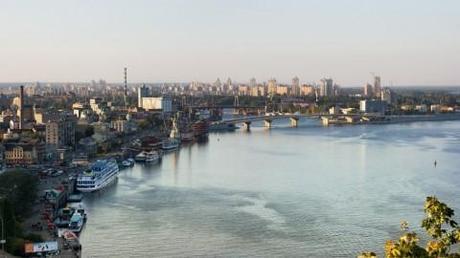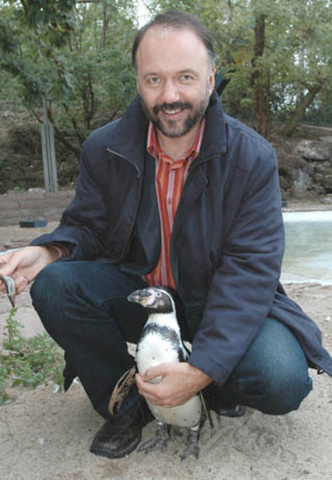
Recently I stumbled across Andrey Kurkov’s Death and the Penguin,
a deadpan satire of a single man and his pet penguin struggling to get by in Ukraine’s capital, Kyiv. The little novel points squarely at the sometimes absurd but functional atmosphere of Ukraine, where corruption runs rampant and entrepreneurs struggle to hold their own.
The novel follows Viktor, a middle-aged aspiring writer living with his pet penguin, Misha. True to real life, the zoo had been giving away hungry animals to anyone who could feed them. Viktor, abandoned by his girlfriend, took Misha in. For Viktor, too, times were hard, so when he is offered the questionable opportunity to write obituaries for VIPs who are still living, he is quick to accept. Unfortunately, these obits turn out to be a sort of hit list: following each obituary, the subject’s death ensues, which he discovers only later in the morning newspaper. He soon comes to realize that the last obituary he will write will be his own.

Andrey Kurkov poses with a penguin. (Photo: Random House UK)
Kurkov’s depiction of post-Soviet life is lined with deadpan satire that clings to the edges of the structures of corruption that have made the country hostile to its own people. One day a commercial comes on the television: penguins in Antarctica, splashing, at home. Misha begins to throw himself at the screen. Ukrainians researchers pop into the frame.
“I appeal to private entrepreneurs and others with funds – on you depends whether our scientists will be able to continue their work in the Antarctic. Have a pencil and paper ready for the account number to which sponsor donations can be made, and a telephone number on which you can hear details of what your money will be spent on,” says a woman. Viktor runs to jot down the information. Despite his friend’s skepticism, Viktor makes a donation, hoping to send Misha to Antarctica. But when that last obit is requested, it is Viktor who takes a place among the crew – it is these entrepreneurs who have saved him.
Death and the Penguin is both honest and absurd, provocatively raising a number of important issues about life in Ukraine– chief among them the role of the private sector. It is a topic that CIPE writes about extensively, showing how developing countries need entrepreneurship in order to expand access to opportunity, break down structures of corruption, and drive growth. To support democracy, small and medium enterprises must have the ability to function such that individuals can work for their livelihood.
CIPE Ukraine is dedicated to bringing people together through their businesses and the associations that represent them. In building the capacity of business associations in Ukraine, CIPE has responded to the growing will to collaborate. The most recent project of CIPE’s Ukraine office began under the framework of a workshop in Kyiv for leaders of business associations to set priorities for candidates who took part in the October 2012 parliamentary elections. The workshop was held in June 2012 and set the tone for a training seminar sessions and a mini-grant competition that took place in the fall.
CIPE awarded small grants to aid business leaders in conducting a survey of 2,050 entrepreneurs across Ukraine on the biggest issues in their communities in order to help formulate top priorities for politicians and officials. The local business legislative priorities were then publicized ahead of the parliamentary election. Of the 47 parliamentary candidates who subsequently pledged to pursue the legislative priorities, four candidates won office in Ukraine’s legislature, the Verhovna Rada.

A fight breaks out in the Verhovna Rada shortly after the election. Pro-business reformers remained hopeful. (Photo: Associated Press)
Following this, CIPE held a training program for business associations focusing on internal capacity building through mission development, internal governance, resource management, and communications. After the second session, 72 percent of participants reported having created or revised strategic plans for their organizations. By summer, the growth of the organizations, in terms of membership and budgets, reflected an increased stability as business associations solidified their missions, strategic goals and adapted to represent their constituencies: a final survey reflected an average increase of 15 percent in membership, as well as a typical increase in operating budgets of between 10 and 50 percent.
This deepening of scope and skill has led to a growing sense of collaborative political will among business associations (and the individual entrepreneurs wherein), evidenced by new initiatives aimed at fostering cooperation across regions. Three new collaborative inter-regional tasks forces focused on deregulation issues, SME access to credit, and anti-corruption issues, began in the last year.
CIPE Kyiv staff continued to raise interest in business and civic issues across Ukraine, not only within the business community, but among government officials and the greater public. This was highlighted as CIPE Ukraine staff coordinated a two-day forum in July, bringing business association leaders and the four Verhovna Rada deputies who had taken the pledge so that constituents could hold deputies accountable for their commitments. More than a hundred participants registered for the forum – an unexpectedly high turnout.
This interest is reflected between the lines of Andrey Kurkov’s 2011 op-ed in the New York Times, Drinking on the People’s Tab. As the title suggests, it is the Ukrainian reality that businesses often still can’t get off the ground. Entrepreneurs still struggle just to open their businesses, but still people come together in the spirit of entrepreneurship. Opportunity is woven through the larger Ukrainian narrative.
Kurkov wrote about a village friend’s attempt to sell ice cream. “The business wouldn’t be too bad,” the friend said, “if it were not for our policemen who always came and took ice cream without paying.” In another anecdote, following the Orange Revolution, the new local administrator of Kurkov’s village had been bribed to sell the villagers’ communal land. Neighbors came to Kurkov with a request to write and distribute an article for the local newspaper to tell the tale. It was not long before the administrator was caught.
At first, Kurkov wrote that while he felt pride in his own power, it soon became clear to him that the only reason the administrator had been caught was because he had stolen from many, not from him alone. Kurkov wrote: “…as soon as real democracy comes to Ukraine, Ukrainians will quickly grow accustomed to it… The authorities must simply create the appropriate conditions.” Kurkov did not elaborate, but as Death and the Penguin resounds, we may wonder what actions propel authorities to create such conditions, and, at second glance, we may wonder further – who are these authorities exactly?
Perhaps he has answered the question himself: “My village has taught me a lot, so I am glad whenever I can be of some use to it,” he wrote.
Rachel Grossman is Program Assistant for Eurasia at CIPE.

